Hyundai Santa Fe vs Mercedes EQB – Performance, range & efficiency compared
Both models have their strengths – but which one suits you more?
Compare performance, efficiency, price and space directly: Hyundai Santa Fe or Mercedes EQB?
Here’s where it gets real: The technical differences in detail
Costs and Efficiency: Looking at overall running costs, both models reveal some interesting differences in everyday economy.
Mercedes EQB has the somewhat advantage in terms of price – starting at 45900 £, while the Hyundai Santa Fe starts at 51200 £. That’s a price difference of about 5345 £.
In terms of range, the Mercedes EQB performs significantly better – offering up to 535 km, roughly 481 km more than the Hyundai Santa Fe.
Engine and Performance: Under the bonnet, it becomes clear which model is tuned for sportiness and which one takes the lead when you hit the accelerator.
When it comes to engine performance, the Mercedes EQB clearly takes the lead – with 292 HP compared to 253 HP. That’s a power increase of roughly 39 HP.
In acceleration from 0 to 100 km/h, the Mercedes EQB is strongly faster – completing the sprint in 6.20 s, while the Hyundai Santa Fe takes 9 s. That makes it around 2.80 s quicker.
In terms of top speed, the Hyundai Santa Fe is slightly ahead – reaching 196 km/h, while the Mercedes EQB tops out at 160 km/h. The difference is roughly 36 km/h.
There’s also a difference in torque: the Mercedes EQB pulls distinctly stronger, offering 520 Nm compared to 380 Nm. That’s about 140 Nm difference.
Space and Everyday Use: Cabin size, boot volume and payload all play a role in everyday practicality. Here, comfort and flexibility make the difference.
Seats: Hyundai Santa Fe offers noticeably more seating – 7 vs 5.
The Hyundai Santa Fe is slightly lighter – 1920 kg compared to 2105 kg. The weight difference is around 185 kg.
In trunk capacity, the Hyundai Santa Fe takes the lead – 711 L compared to 495 L. That’s around 216 L difference.
In maximum load capacity, Hyundai Santa Fe wins – up to 2032 L, about 322 L more than the Mercedes EQB.
Payload capacity also favors the Hyundai Santa Fe clearly – 665 kg compared to 435 kg. The difference is roughly 230 kg.
Overall, the Mercedes EQB proves to be wins this duel convincingly and secures the title of DriveDuel Champion.
It impresses with the more balanced overall package and is the more versatile choice for everyday driving.
Hyundai Santa Fe
The Hyundai Santa Fe offers a refined blend of style and functionality, making it a strong contender in the SUV market. Its modern interior, combined with advanced technology and comfort features, creates an inviting and practical driving environment. With its sleek design and robust performance, the Santa Fe is well-suited for both urban commutes and family adventures.
details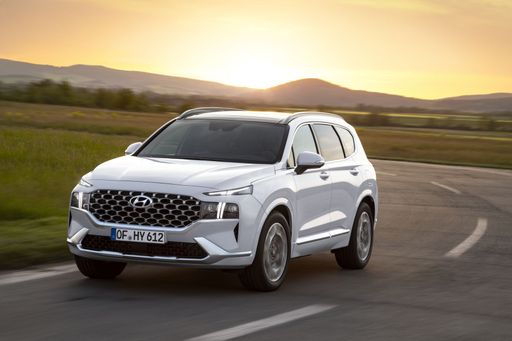 @ hyundai.news
@ hyundai.news
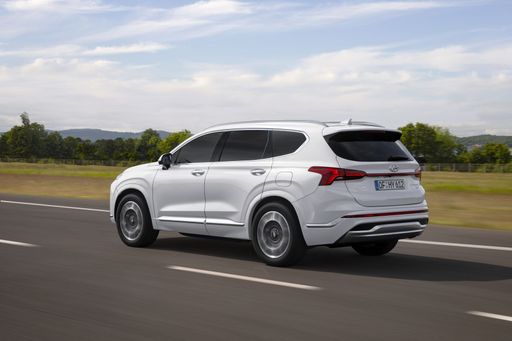 @ hyundai.news
@ hyundai.news
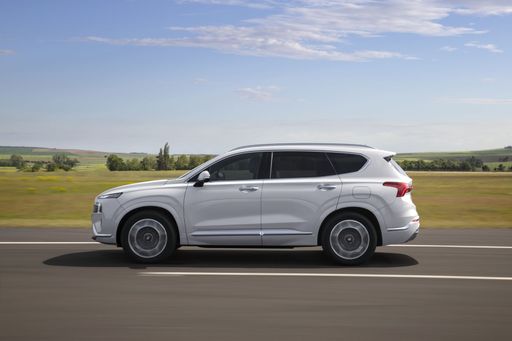 @ hyundai.news
@ hyundai.news
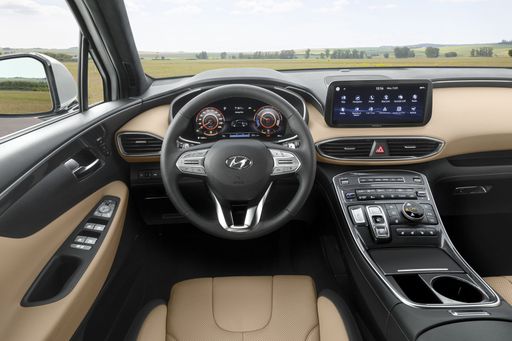 @ hyundai.news
@ hyundai.news
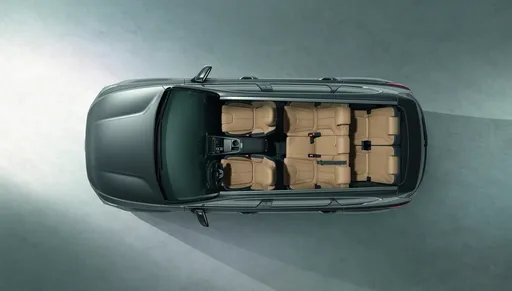 @ hyundai.news
@ hyundai.news
Mercedes EQB
The Mercedes-Benz EQB is an all-electric compact SUV that seamlessly blends practicality with modern luxury. Its sleek design and spacious interior make it an attractive option for families seeking both style and function. With advanced technology and impressive range capabilities, the EQB is a testament to Mercedes-Benz's commitment to sustainable mobility.
details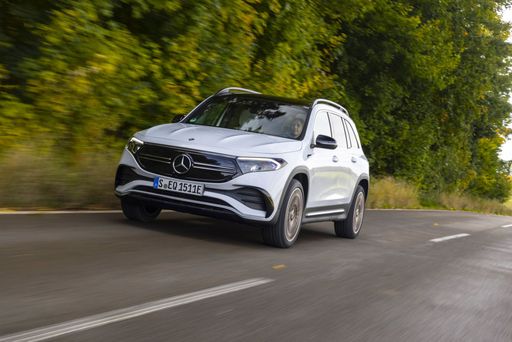 @ group-media.mercedes-benz.com
@ group-media.mercedes-benz.com
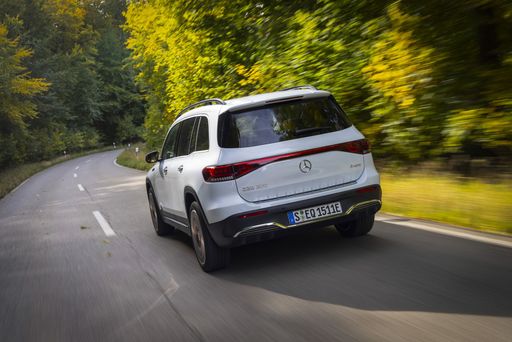 @ group-media.mercedes-benz.com
@ group-media.mercedes-benz.com
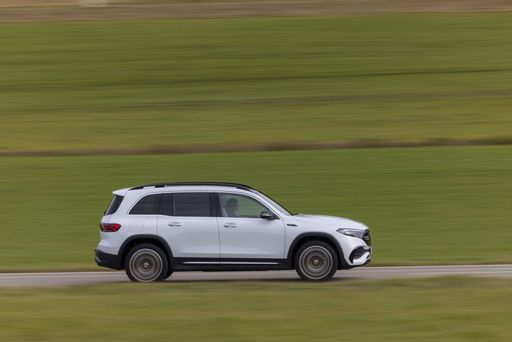 @ group-media.mercedes-benz.com
@ group-media.mercedes-benz.com
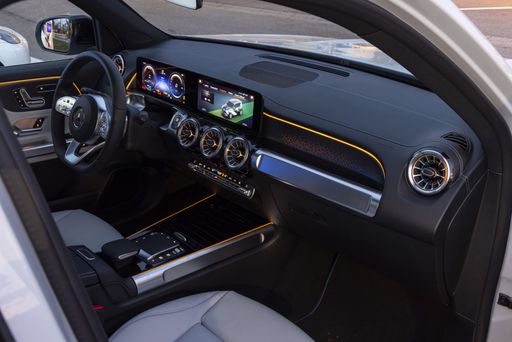 @ group-media.mercedes-benz.com
@ group-media.mercedes-benz.com
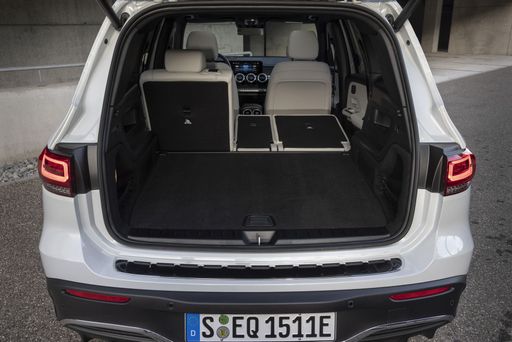 @ group-media.mercedes-benz.com
@ group-media.mercedes-benz.com

|

|
|
|
|
Costs and Consumption |
|
|---|---|
|
Price
51200 - 58400 £
|
Price
45900 - 58900 £
|
|
Consumption L/100km
1.7 - 7.1 L
|
Consumption L/100km
-
|
|
Consumption kWh/100km
-
|
Consumption kWh/100km
15.2 - 17.2 kWh
|
|
Electric Range
54 km
|
Electric Range
468 - 535 km
|
|
Battery Capacity
-
|
Battery Capacity
70.50 kWh
|
|
co2
38 - 160 g/km
|
co2
0 g/km
|
|
Fuel tank capacity
47 - 67 L
|
Fuel tank capacity
-
|
Dimensions and Body |
|
|---|---|
|
Body Type
SUV
|
Body Type
SUV
|
|
Seats
5 - 7
|
Seats
5
|
|
Doors
5
|
Doors
5
|
|
Curb weight
1920 - 2165 kg
|
Curb weight
2105 - 2170 kg
|
|
Trunk capacity
621 - 711 L
|
Trunk capacity
495 L
|
|
Length
4830 mm
|
Length
4684 mm
|
|
Width
1900 mm
|
Width
1834 mm
|
|
Height
1720 mm
|
Height
1654 - 1689 mm
|
|
Max trunk capacity
1942 - 2032 L
|
Max trunk capacity
1710 L
|
|
Payload
560 - 665 kg
|
Payload
435 kg
|
Engine and Performance |
|
|---|---|
|
Engine Type
Plugin Hybrid, Full Hybrid
|
Engine Type
Electric
|
|
Transmission
Automatic
|
Transmission
Automatic
|
|
Transmission Detail
Automatic Gearbox
|
Transmission Detail
Reduction Gearbox
|
|
Drive Type
All-Wheel Drive, Front-Wheel Drive
|
Drive Type
Front-Wheel Drive, All-Wheel Drive
|
|
Power HP
239 - 253 HP
|
Power HP
190 - 292 HP
|
|
Acceleration 0-100km/h
9 - 9.3 s
|
Acceleration 0-100km/h
6.2 - 8.9 s
|
|
Max Speed
180 - 196 km/h
|
Max Speed
160 km/h
|
|
Torque
367 - 380 Nm
|
Torque
385 - 520 Nm
|
|
Number of Cylinders
4
|
Number of Cylinders
-
|
|
Power kW
176 - 186 kW
|
Power kW
140 - 215 kW
|
|
Engine capacity
1598 cm3
|
Engine capacity
-
|
General |
|
|---|---|
|
Model Year
2024 - 2025
|
Model Year
2024 - 2025
|
|
CO2 Efficiency Class
B, E, F
|
CO2 Efficiency Class
A
|
|
Brand
Hyundai
|
Brand
Mercedes-Benz
|
What drivetrain options does the Hyundai Santa Fe have?
Available configurations include All-Wheel Drive or Front-Wheel Drive.
The prices and data displayed are estimates based on German list prices and may vary by country. This information is not legally binding.
